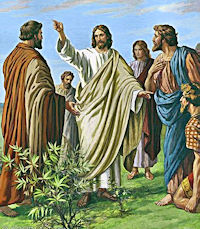» Enjoy our Liturgical Seasons series of e-books!
Jesus came home with his disciples. Again the crowd gathered, making it impossible for them even to eat. When his relatives heard of this they set out to seize him, for they said, "He is out of his mind." The scribes who had come from Jerusalem said, "He is possessed by Beelzebul," and "By the prince of demons he drives out demons" (Mk 3:20-23).
Today's Optional Memorial of the St. Ephrem is superseded by the Sunday Liturgy.
Commentary on the Mass Readings for the Tenth Sunday in Ordinary Time, Year B:
The First Reading is taken from Genesis 3:9-15 and gives the background and reason for the call of Abraham.
The Second Reading is from St. Paul's 2nd Letter to the Corinthians 4:13-5:1. St. Paul compares his life on earth to a temporary dwelling, a tent, something not very durable, whereas God has prepared for us a new body—a new, glorious and permanent dwelling or mode of living in heaven.
The Gospel is from St. Mark 3:20-35. The truth of the saying "pride goeth before destruction" (Prov. 16:18) is clearly demonstrated in the first and third readings today. Pride indeed induced the First Parents to disobey God. They wished to be independent of him, in fact, they hoped to be his equals. The evil results of their folly are still among us. It was their sinful pride, their sense of superiority, their utter contempt for all who did not conform to their standard of observance, that led the Scribes and Pharisees to oppose Jesus. Blinded as they were by this deep-rooted pride, they could see nothing good in him. Absurdly, they explained as the work of Satan the miracles he worked. To any honest mind, these miracles proved that he was, at least, a friend of God. That most of the Scribes and Pharisees continued in their blind pride even after their attempt to silence him forever had failed, is most likely, as Jesus' reference to the unforgivable sin would indicate. They could not be forgiven while they refused, through pride, to ask for forgiveness.
While we can thank God that perhaps none of us has the same exalted opinion of himself as had the Scribes and Pharisees, there is still much pride in even the best of us. It is still the root of all the evil that is in our world. If faithfully observed the Ten Commandments of God would make the journey of all men to heaven easier, safer and surer. But they are violated daily. Why? Because proud men refuse to be restricted in their actions. They cannot admit that any higher power has the right to regulate their lives; they are the sole arbiters of their fate; they will do as they please.
Which of us would admit to violating the first commandment? "I am the Lord your God, you shall not have strange gods before me." We never even thought of adoring a false god, we will say, we would never think of setting up a statue of Mars or Jove or Venus and bowing the knee before it. Yet, every time we break the law of God, we are setting up an idol—one more absurd than any false god of the pagan world. We are setting up our own self, our own will, our own authority in the place of God. We will not have him rule over us!
We are living today in what is politely called the permissive age—the age when God's laws are shamelessly flouted and despised; the age when men and women, old as well as young, do what they like regardless of whether or not their actions offend God and neighbor. This is a false philosophy, not of life, but of death; this is a philosophy or whim which has the ripe seeds of destruction of human society breaking through its crust. How long can we go on living together on earth, if each one claims the right to do as he pleases? If, with impunity, we can lay our hands on all the wealth and property we feel we want, what of our neighbors whom we despoil? If we can drive a coach and four through the laws of the state, which are themselves applications of the laws of God, how long can our state last? If, outside of marriage, we have every right to enjoy all the sexual pleasure of which we are capable, who is going to take on himself the responsibilities of married life: Who will produce the next generation of citizens and who will feed and educate them! If we have the right to all possible comfort, pleasure and ease in this life, then abortion, euthanasia for the old and defectives, in fact, the quiet removal of anyone who stands in our way, who interferes with our absolute freedom, is not only lawful but absolutely necessary! How many will survive this regime?
Of course, those who approve of and demand permissiveness, do not encourage going to such extremes—except when it suits them. But if there is no divine authority the state laws will have to be enforced with the gun. They will collapse, however, once a sufficient number of citizens opt for permissiveness.
He who does the will of God is the brother and kinsman of Christ and only his true brothers will get to heaven. We must keep the commandments of God. not only are they the guides that will keep us on the road to heaven, but they are our only guarantee of survival during our short sojourn here on earth.
—Excerpted from The Sunday Readings, Cycle B, Fr. Kevin O'Sullivan, O.F.M.






